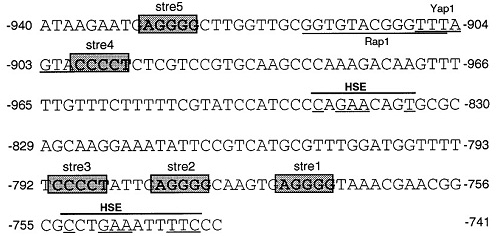Team:TU Munich/Project/Ethanol Inducible Promoter
From 2012.igem.org
(→Background and principles) |
(→Background and principles) |
||
| Line 13: | Line 13: | ||
'''KlADH4''' | '''KlADH4''' | ||
| - | [[File:TUM12_Sequence_KlADH4_promoter.jpg|thumb|lright| | + | [[File:TUM12_Sequence_KlADH4_promoter.jpg|thumb|lright|280px|Picture taken from: Mazzoni et al., Molecular Analysis of UAS<sub>E</sub>]] |
The ''k. lactis'' gene KlADH4 encodes a mitochondrial Alcohol Dehydrogenase which can be specifically induced by ethanol and is insensitive to glucose repression. A small region in the KlADH4 promoter, called UAS<sub>E</sub>, is responsible for expression of the gene in presence of ethanol. UAS<sub>E</sub> is a cis-element of the KlADH4 promoter spanning from -953 to -741 and contains five stress response elements (STREs), which have been found in many ''s. cerevisiae'' genes. When inserted into the promoters of heterologous genes, these genes become ethanol-inducible. | The ''k. lactis'' gene KlADH4 encodes a mitochondrial Alcohol Dehydrogenase which can be specifically induced by ethanol and is insensitive to glucose repression. A small region in the KlADH4 promoter, called UAS<sub>E</sub>, is responsible for expression of the gene in presence of ethanol. UAS<sub>E</sub> is a cis-element of the KlADH4 promoter spanning from -953 to -741 and contains five stress response elements (STREs), which have been found in many ''s. cerevisiae'' genes. When inserted into the promoters of heterologous genes, these genes become ethanol-inducible. | ||
Revision as of 14:05, 15 August 2012



Contents |
Ethanol Inducible Promoter
KlADH4-Promoter
Background and principles
Original organism: kluyveromyces lactis
K. lactis is a crabtree-negative yeast, which means it does not produce ethanol under aerobic conditions. S. cerevisiae, on the other hand, is crabtree-positive. Another interesting fact about k. lactis is its ability to grow on ethanol as the only carbon source. File:TUM12 Paper Primary Carbon Metabolism.PDF
KlADH4
The k. lactis gene KlADH4 encodes a mitochondrial Alcohol Dehydrogenase which can be specifically induced by ethanol and is insensitive to glucose repression. A small region in the KlADH4 promoter, called UASE, is responsible for expression of the gene in presence of ethanol. UASE is a cis-element of the KlADH4 promoter spanning from -953 to -741 and contains five stress response elements (STREs), which have been found in many s. cerevisiae genes. When inserted into the promoters of heterologous genes, these genes become ethanol-inducible.
The sequence contains:
- a putative binding site for Yap1p between -906/-900, a transcription factor involved in stress response in S. cerevisiae and K. lactis
- two putative heat shock elements (HSE)
- consensus sequence of the binding site of Rap1 protein. RAP1 (repressor activator protein 1) is an essential gene present in both S. cerevisiae and K. lactis and acts positively or negatively on the expression of many genes. Rap1 binding sites have been found in promoters of glycolytic genes where they play a positive role in transcription
Despite the presence of the STREs, KLADH4 is not a stress responsive gene.
File:TUM12 Paper Mazzoni Analysis UASE.PDF
Idea
General remarks and issues
Although there is evidence that the KlADH4 promoter can be used for ethanol dependent production of recombinant proteins in K. lactis (File:TUM12 Paper KlADH4 for recombinant expression.PDF), I did not find any literature which indicated that this alcohol-inducibble promoter has been used in other organisms such as S. cerevisiae. However, I believe that the necessary transcription factors etc. should be present in S. cerevisiae, because the Rap1 gene and the STREs can also be found in s. cerevisiae. Therefore I suggest we should try to introduce a construct consisting of the UASE-element and a reporter gene and examine whether this is enough to make the gene alcohol-inducible. If it does not work, there must be other factors involved which are not present in S. cerevisiae. If it does work, we have an alcohol inducible promoter for S. cerevisiae. :-)
 "
"
